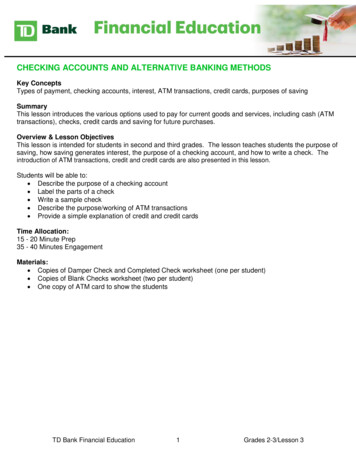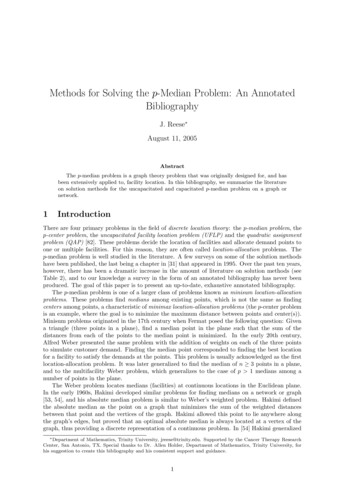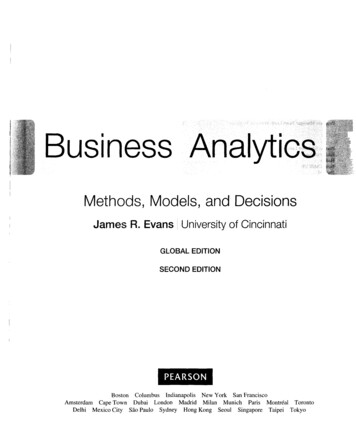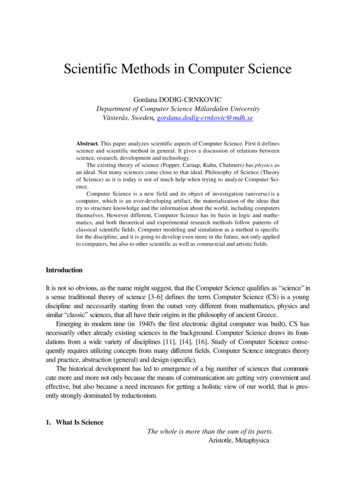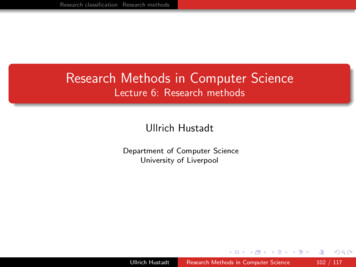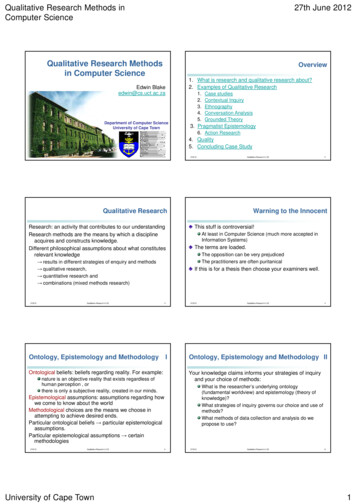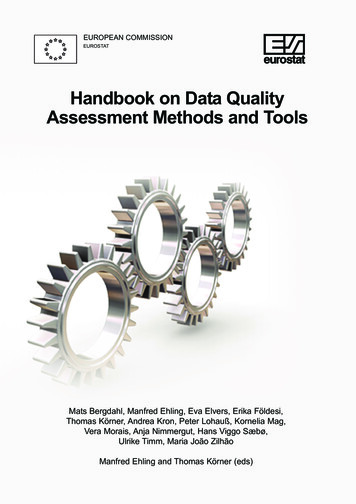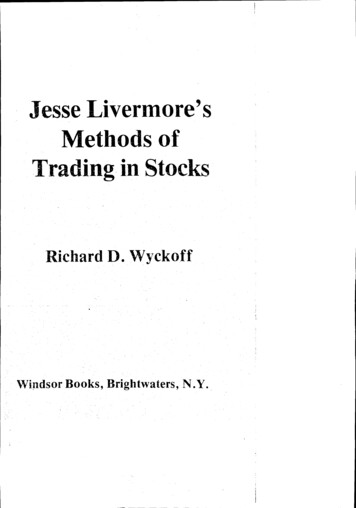
Transcription
Jesse Livermore'sMethods ofTrading in StocksRichard D.明'yckoffWindsor Books ,Brightwatel飞N.Y.
Jesse Livermore' sMethods ofTrading in StocksRichard D. WyckoffAll rights reservedincluding the right of reproductionin whole or in part in any formCopyright 1984 by Windsor BooksPublished by Windsor BooksBrightwaters ,N.Y. 11718Manufacturedin the United States of America
毛JContentsCHAPTERPreface.1.PAGE. . . . . . . . . . . . . . . . . . . . . . . . . . . . . . . . . .Meet The Market'sGreatestTrader. . . . . . . . . . . . .33The Secretive OperatorA Titanic OperatorHe Consents To An InterviewA Lesson To Be LearnedAvoid The Weak IndustriesStocks Have Their Seasons and FashionsThe One Sure Way To Succeed In The MarketLivermore's Essential To Success2.How He PreparesFor The Day's Work. . . . . . . . . . . . 7The Early LivermoreOrganizing His Market Work DayIn Trim For The Day's WorkDigs For FactsHe Learns For HimselfHe Concentrates On Essentia1sThe Market Requires Study3.The SpecialArrangementsOf His Office. . . . . . . . . . .12How He Insulates Himself From Bad Inf1uencesPoise ,An Indispensable AdjunctWhat He Hates The MostHis Office EquipmentSimilarity With James R. KeeneHow He Interprets The News4.How LivermoreReadsThe Tape. . . . . . . . . . . . . . . 17How He Judges The Turning PointsHow He Plays The Intermediate Swings. .5.How He Makes His CommitmentsHis Minimum ProspectiveProfit.And Limits His Risk. . . . . . . . . . .22Lessons From Successful OperatorsHow He Limits His Risk6.How He Keeps His CapitalTunúngOver. . . . . . . . . . 2S"Drifting" Stocks Cost Moneyy He's Always Ready For Opportunities讯而7.The Kind Of StocksIn Which To Trade.Livermore Wants "Action"8.Livermore'sMethod. . . . . . . . . . . 28StocksOf Pyraminding.ALesson From A Commodity SpeculatorACool Head For Supreme DecisionsIn Summary. . . . . . . . . . . .303
CHAPTER 1PrefaceThe material presented here first appeared as a continuingseries of articles in the Magazine of Wall Street. They wereobtained through exclusive interviews with Jesse Liverrnoreby R.D. Wyckoff at a time when Livermore was the sing1emost formidable factor in the market.After being "lost" for many years. these interviews are nowbrought together for the first time under the covers of a book.Meet the Markets Greatest TraderEvery c1ass in organized society 01' organized industry has its leaders 一 itsconspicuousfigures.whocombine in the fullest sense the attributesof theirparticular c1ass.These leaders are not seleeted by popular vote. They arenot selected at all. They reach the highest ranks through their own individualefforts. battling their way against whatever odds appear ,redoublingtheirefforts whentheinevitable setbaeks occur.Söme of these leaders get there. as the saying goes. more quiekly thanothers: some rise by more brilliant tactics. 8ut ,irrespectiveof how long ittakes any of them to arrive ,they no sooner definitely do arrive than theirfame spreads almost like flashes of light into every nook and cranny of thercading world. An enterprisingpress. incessantly on the lookout for new idolsto sct before the public. does the trick.THE SECRETlVE OPERATORThe press , which has made the aehievementsof these leaders commonproperty has-in nearly every case.donethesamething with their methods.thefr principles and beliefs. To feed the pub1ic's insatiable interest in thesemcn's innermost views ,their opinions have been demanded on nearly everycontroversialquestion under the sun-andin some cases obtained ,Scarcelyone 01' them has kept himself to himself. even among the very few who sodcsired.There are exceptionsto every rule. however; and there is a glaringcxccption to this one. For the man who towers head and shoulders above allothcrs in onc p 盯 ticular field -theman who is almost the sole leader 01' thattïcld-hassuccessful1y evaded publicity in the past ,and has kept himselfvcry detinitelyto hÎmself. This man's reticencehas been all the moreimprcssivcbecause of the natureof the field he dominates.one which
儿1eet4The 儿1arket's Greatest Trαderinterests a far greater sectíon of the public than any other ,and one in whichfar greater numbers actively participate.He is the one man in theonefieldthat most people would rather hear talk than anybody else.The field referredto is that of active speculationin secucities.Thedominant leader of the field ,as everybody knows ,is Jesse L. Livermore.A TlTANICOPERATORLivermore started trading in securities when he was fourteen years old. Hemad 巳 his fïrst thousand when a mere boy. He has practiced every deviceknown to the active speculator. studied every speculative theory. and d 巳 alt inabout every active security Iisted on the New York Stock Exchange.He has piled up gigantic fortunesfrom his commitments , lost them.digested. started all over again-andpiled up new fortunes.He has changed his market position in the twinkling of an eye-soldoutthousands of shares of long stock , and gone short of thousandsof sharesmore on a decision which required reading only the one word , but ," in alengthy ticker statement.If hls later experiences were not enough to catch the public fancy , Livermorewould have won it by his greatest feat of all: beating the bucket shops.Beating the cheaters , in fact ,was Livermore'spet plan after things hadgone against him and he was forced to start anew on a small 斗 ot basis.HE CONSENTSTO AN INTERVIEWUntil of late ,Livermore has maintaíned absolute silence when questionedabout his past operations.Perhaps it was because he did not want to lead thecasuaJ ,poorly prepared investor into the arena where only master studentssurvived.It is not his custom to brag about himself ,but no doubt he felt that themethods worked out at the cost of a Iifetime of battering ,courage-strainingeffort were not lightly to be tossed into the amateur'sIap.Mr. Livermore's wiIIingness to be interviewedby me and to be quoted hasbeen in part influenced by the work 1 have done in the past in shedding lighton Wall Street's ways ,Wall Street'smen ,their theories and methods-inreaI educationalwork which has led to more intelligent operatingmethodsbeing empJoyed by the publicOn the eve of departurefor a Europeanvacation , Livermore said , "themost inteIIigent way toget one's mind attuncd to market conditions and to besuccessfulis to make a deep study of industriesin order to be able todistinguish the good from the bad; get long of those which are in a promisingposition and get out of those which are not.川A LESSON"1 regardabove factsTO BE LEARNEDit of great,becauseimportanceto caII the attention of the readers to theit has been shown time and again that in WaII Street'‘1是
M eet The M arket's Greatest Trader5peop1e very often fai1 to see the thing that is right under their nose. We nowhave millions of peop1e interested in the security markets. where there wereon1y thousands in former years; and 1 cannot emphasize too strongly theimportance of the utmost discrimination in the purchase of securities at thepresent time. One of the greatest mistakes inexperienced investors make is inbuying cheap securities just because they are selling at a low price. As amatter of fact. price is not always an indication of cheapness. becausenon-dividend paying stocks have a certain speculative value that usuallycauses them to sell at more than they are worth on the basis of eitherearnings or possible initia1 dividends. Whi1e it may happen that in manyinstances stocks advance from 30 to 40 a share to over 100 ,a very muchgreater proportion of these low.priced stocks have sunk into ob1ivion by goinginto receivership ,or e1se they have strugg1ed along striving to make bothends meet for years and years. with on1y the faintest prospects of ever payinga return to their stockholders."In selecting securities. it is onl)' necessary for an investor to determinewhich industries are in the strongest position. which are less strong andwhich are comparatively weak. very weak. etc."AVOID THE WEAK INDUSTRIESMany investors do not discriminate between strong and weak stocks: andin fai1ing to recognize these essentia1 differences. they p1ace themselves in aposition to lose many excellent investment opportunities. As Mr. Livermoresays: .‘1 Find it best to avoid the weak industries entirely. 1 shouldparticularly avoid the lower.priced stocks that have not a firm financialfoundation. because when a declining movement does set in , securitiesrepresenting these weak industries are the first to go and they recover onlywith the great!est difficulty. Thus. we should avoid getting hung up with thesecheap stocks ,and companies that are poorly financed ,for without ampleworking capital such concerns will have a hard row to hoe under severecom petition.Just as 1would avoid the weak industries and the weak stocks. so 1 wouldfavor the strongest industries and the strongest stocks. 1 would choose thoseindustries that face a most promising future so far as can be seen underpresent conditions. We must ,of course ,be able and willing to revise ourforecasts in the light of developments that come to hand frorn day to day.STOCKS HA VE THEIR SEASONS AND FASHIONSIn making selections of securities ,investors should remember that thedemand does not break out in all commodities at the same tirne. Everythinghas its season ,and it is very important that this should be taken intoconsideration. For example. as everyone knows , the best season for themotor and tire stocks is in the spring and summer. The stock marketgenerally discounts this activity a little in advance. 1 would be illogical toexpect these stocks to continue to advance after their best season is over.Conditions that affect one group of stocks favorably might be precisely the
t号'6儿1eet The 儿1arket'5Greate5tTrαderones to affect others unfavorably.Thus it wil1 be seen that there are fashions as wel1 as seasons ininvestments. Conditions change ,and one ha ;not only to keep pace with thechanges ,but to look forward and see what changes are likely to Occur sixmonths to a year hence. Unless an investor does this he will soon find himselfin the painful position of being hung up with a lot of stocks that have goneover the top and turned downward. He wil1 find his funds tied up so that hecan't use them.Investors should insure themselves against such a situation by notplunging in the cheap stocks ,but by keeping the principal portion of theirfunds liquid so that when a good investment issue comes along they wil1be ina position to take advantage of it. Perhaps nothing has so interfered with theproverbial1y poor success of the public in the investment market as thisfact 一 that i does not keep its investment and speculative fun ds in propercirculation. The public is usual1y in a loaded-up or tied-up condition. Tel1 thepublic that a certain stock may advance a few points a month and do you findthem interested? No ,they want something that moves more quickly. Yet in afew months they will probably wake up to see the stock selling twenty pointshigher and the cheap stocks which they bought sel1ing at less than the pricespaid for them.THE ONE SURE WAY TO SUCCEED IN THE MARKETTel1 your readers that there is no magic about success in the stock market.That the only way 1 know for anyone to succeed in his investments is for himto investigate before he invests; to look before he leaps; to stick to thefundamentals and disregard everything else:No man can succeed in the market unless he acquires a fundamentalknowledge of economics and thoroughly familiarizes himself with conditionsof every - sort-thefinancial position of a company. its past history ,production. as wel1 as the state of the industry in which it is engaged ,and tllegeneral economic situation.LlVERMORE'SESSENTIALTO SUCCESSEssentials tostock market success are knowledge and patience. 0 fewpeople succeed in the market because they have no patience. They want toget rich quickly. They are not wil1ing to buy when a thing goes down ,andwait. They buy mostly when a thing is going up ,and near the top.In the long run ,patience counts more than any other element exceptknowledge. The two really go hand in hand. Those who want to succeedthrough their investments should learn that simple truth. Also this.investigate before you buy and then you are sure that your position is a soundone. Don't let yourself become discouraged by the fact that your securitiesare moving slowly. Good securities in time appreciate sufficiently to make itwel1 worthwhile to have patience ,especial1y ina bul1 market like the presentone.Think in terms of the industrial outlook; choose the strongest cornpany inthe strongest industry. and do not buy stocks on hope alone.Thc only tirne to buy is when you know they wil1 go up."
1CHAPTER2How He Prepares for the Day's WorkTHE EARLY LIVERMOREln undertaking to analyze the methods which Jesse L. Livermore employsin the stock market ,1 shall not begin by presenting the history of his pastoperations ,but will merely recount the fact that he began at an early age(fourteen); and up to 1922 had been trading in stocks for .about thirty years.Of this period ,twenty-five years were devoted to finding himself. Hisfortunes during that time f1uctuated widely from a five dollar bill to a milliondollars ,back to nothing and on down to a million or more in debt ,all of whichshowed his abi1ity to make money in the market at times; his difficulty was inkeeping it. proving that his methods were then only partly efficient.How he eventually discovered and conquered his weak points;howheturned his active ,uncertain form of trading into comparatively inactivelong-pull operating which was consistently profitable in the net. are subjectsfor later portions ofthis series. Without further introduction ,therefore. let usproceed to analyze Mr. Livermore's methods , for everyone who hasattempted to make money in securities is desirous of learning the "how" ofthe business. and no better example can be found.ORGANIZING HIS MARKETWORKDAYAn
non-dividend paying stocks have a certain speculative value that usually causes them to sell at more than they are worth on the basis of either earnings or possible initia1 dividends. Whi1e it may happen that in many instances stocks advance from 30to 40 ashare to over 100,a very much



